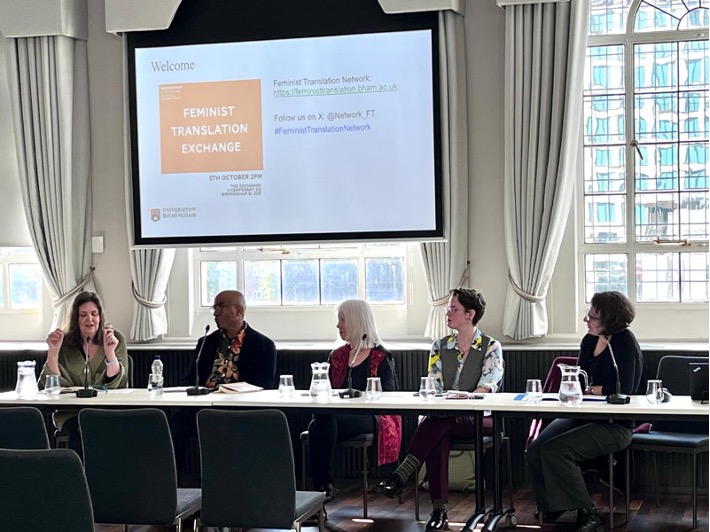A feminist translation network involving researchers and practitioners is important for sharing, developing and creating feminist translation strategies. I am a translator and academic based in London and I travelled to Birmingham in October 2024 for the FTN’s opening event at the Birmingham Literature Festival. The discussions at the first event showed that the translation process always involves dialogues with others – these others can include the author, editors, publishers, as well as other translators – so although some of the work may happen in isolation, a translation never goes out into the world without the input of others.
For me, feminist translation as a practice can be extended to the ways we work and exchange ideas with those other people involved in getting the translation published or performed. I understand feminist translation as an approach which informs both the strategies we apply to the text we are translating, as well as the collaborative work involved in getting a translation ready for performance or publication. This is because a feminist translation approach can inform the ways we ask questions, the ways we collaborate, the spaces we create to share our practice and ideas, as well as our openness to understanding how feminist translation practices intersect with other practices, sometimes activist ones. Feminist translation can be combined and enriched by other translation approaches and creating spaces to discuss how this works in practice is an essential role that the network can play.
As a theatre translation researcher and practitioner, a feminist translation approach has underpinned my work, particularly when sharing work in progress as well as when creating ways to test and develop new theatre translations through workshops involving theatre-makers and translators. For example, I have written here about a symposium I organized recently in London on ‘Feminist Translation in Practice’ which included a reading, roundtable and workshop and brought together translation researchers and practitioners. Workshops are creative spaces which offer opportunities to share expertise, experience and strategies for creating robust theatre translations which can be performed in a new language and context. My current research explores links between theatre, performance and activism in the work of Latin American women playwrights and seeks to create methodologies, developed through collaborations, which can form part of a feminist translation process. It’s also my hope that aspects of these methodologies can feed into other creative work and practices.
Collectives such as the Out of the Wings Theatre Translation Collective seek to create laboratory spaces for sharing and developing translations. These spaces where we connect to share translation practice serve to raise the profile of translators and the multiple types of work they undertake; they offer informal types of training which nurture new translation strategies, including feminist translation strategies; they also enable us to develop translation work as part of a critical research methodology and as a creative practice. Above all, they demonstrate that translation is never undertaken totally in isolation. Participation in these networks, collectives and forums can enhance our practice, encourage collaborations and foster a translation ecosystem through which we show how translation intersects with, is informed by, and can inform other creative practices.
Sophie Stevens
Institute of Languages, Cultures and Societies, School of Advanced Study, University of London
Pictured: First FTN event, Birmingham Literature Festival, October 2024

Your point of view caught my eye and was very interesting. Thanks. I have a question for you.
Your article helped me a lot, is there any more related content? Thanks! https://www.binance.com/ar-BH/register?ref=UT2YTZSU
I don’t think the title of your article matches the content lol. Just kidding, mainly because I had some doubts after reading the article. https://www.binance.info/fr/register?ref=T7KCZASX
I don’t think the title of your article matches the content lol. Just kidding, mainly because I had some doubts after reading the article. https://accounts.binance.info/register-person?ref=IXBIAFVY
Your point of view caught my eye and was very interesting. Thanks. I have a question for you. https://www.binance.com/el/register?ref=DB40ITMB
Your article helped me a lot, is there any more related content? Thanks! https://www.binance.info/register?ref=IHJUI7TF